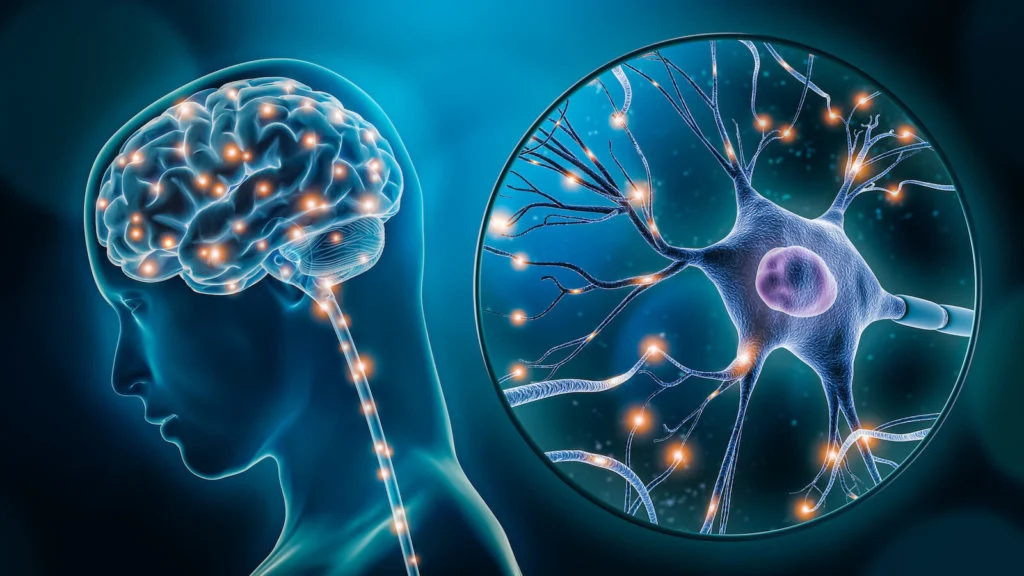What is the vagus nerve and why is it important for your health?

The vagus nerve is a vital part of the gut-brain axis. Metabolites in the gut transmit messages directly to the brain via the vagus nerve.
The vagus nerve consists of a bundle of nerves that links the brain to the rest of the body. It governs many of the processes that are involuntary, this means that we don’t actively have conscious control over the functions. They specifically controlling our rest and digest processes including digestion, heart rate and the immune system.
The vagal nerves are part of the autonomic nervous system which has two different branches. The sympathetic nervous system is responsible for how our body deals with stress and the parasympathetic nervous system governs our ability to relax.
It originates at the 10th cranial nerve and travels from the lowest part of the brainstem down through the heart, lungs, abdomen, digestive tract and into the colon. It’s the longest nerve in the body and influences both physical and mental health. Vagus nerve is a direct translation from Latin meaning wandering nerve as it meanders through so much of the body.
The vagus nerve can detect the health of the digestive system by identifying gut bacteria and transmitting the information to the brain. This process determines overall well-being, the ability to relax and promote emotions such as empathy.
What does the vagus nerve do?
- Governs the parasympathetic nervous system
- Forms the link in the brain to gut axis
- Controls involuntary processes including heart rate, respiration, blood pressure
- Starts the digestion processes when it detects nutrients in the gut
- It recognises and inhibits inflammation
- Immune system responses
Neurotransmitters, dopamine, serotonin, GABA (gamma-aminobutyric acid) and norepinephrine are created in the gut and transferred via the vagus nerve to the brain. These neurotransmitters collectively effect mood, memory, appetite control and our response to pain. Stimulating the vagus nerve tells your brain that it’s safe to relax and focus on rest and digestion.
When we eat, the vagus nerve picks up any changes in the gut and communicates this information to the brain. The brain then uses this information to start the physiological processes of digestion and reducing inflammation that may be caused.
Research has indicated that there may be a link between the vagus nerve and mood, heart disease, metabolic syndrome and autoimmune diseases.
The vagus nerve and immunity
When a foreign pathogen enters the body, the innate immune system is ready to go into action to target and destroy the invaders by producing cytokines. The onset of inflammation stimulates the vagus nerve which notifies the brain to send reinforcements to the site of infection and once the infection is under control the nerve calms the immune system and returns to a state of homeostasis.
What foods promote vagus nerve health?
Follow an anti-inflammatory diet including a variety of good quality proteins, nuts, pulses, vibrantly coloured vegetables and fruits. The following foods are particularly beneficial.
- Omega-3 fatty acids
- Vitamin B12
- Foods high in choline; beef, eggs, fish, red potatoes, sunflower seeds, quinoa
- Pistachios
- Mediterranean diet
- Probiotic foods, kefir, kimchi, kombucha, sauerkraut
- Foods rich in polyphenols: berries, cocoa, spices, olives, pulses
How breathing stimulates the vagus nerve
The nerve passes directly through the lungs and when you slow down your breathing the brain sends information via the nerve to the brain to let it know that we are calm and in turn slow down an over racing heart. Mindfulness is an excellent practise to create a sense of peace.
Supplements to stimulate the vagus nerve
Cellular Calm Complex
Cellular Calm Complex has been formulated to calm the mind and body thus improving vegal health. The formulation is rich in, l-theanine, choline, ashwagandha, vitamin B12, and magnesium.
Acetylcholine is the main neurotransmitter of the parasympathetic nervous system thus promoting vegal tone.
L-theanine actively promotes the production of GABA and other brain calming chemicals.
Ashwagandha sends messages to the brain via the vegal fibres, these signals alleviate stress, anxiety, depression and insomnia.
Stress depletes the levels of vitamin B12 and can lead to headaches, digestive issues, nausea and sleep problems. Supplementing with B12 helps to alleviate these symptoms.
Low levels of magnesium in the body can increase stress and taking a supplement containing magnesium helps to body to manage its stress response system and cortisol levels.
Immune Complex
Immune Complex contains a blend of ingredients including beta glucans, prebiotics and probiotics. The formula supports a healthy microbiome and in turn the vagal nerves.
Beta glucans are particularly beneficial as these fibres are absorbed into tissue in the small intestines which bind to receptors which induce cytokines, the first line of defence in our immune system.
Pro and prebiotics have a similar role by promoting the production of anti-inflammatory cytokines.
Turmeric is a potent agent that can activate a number of cells in the immune system.




_406x509.jpg)



